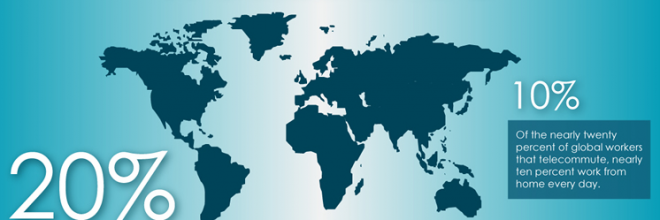You may be familiar with the terms “telecommuting” and “flexible workplace” and both are used to describe what the government now generally refers to as “telework”. In practice, “telework” is a work arrangement that allows an employee to perform work, during any part of regular, paid hours, at an approved alternative worksite (e.g. home, telework center).
Does Your Organization Promote / Support Telework?
Technology has allowed us to be more mobile, but many people aren’t keeping pace with this transformation. Is your organization managing their workforce with models that are decades old? Do you or does your boss still resist allowing employees to telework?
As the Telework Research Network states, employees have already left the building and they’re not coming back!

My First Telework Office (Notice Palm PDA)
Since I started consulting nearly a decade ago, I have been teleworking. Initially it was because my clients were 1500 miles away and the project didn’t have funds for travel. Now, it is still cost effective and it is an accepted, practical business practice. I have successfully written multimillion dollar grants for organizations on the east and west coasts and throughout the Midwest via telecommuting. Still, I have seasoned professionals in the field of grants and consulting who are shocked that I don’t have a huge travel budget built into each project. In fact, I use low-cost or no-cost tools to get the job done and to keep communication clear and constant.
If you don’t know some of the benefits of teleworking it can seem like a great way to lose control over employees and projects.

Click on image to see original
- Employees who telework are often more productive and generate better quality work due to the quiet environment where interruptions are minimized.
- Supervisors experience improved employee loyalty and commitment. Supervisors often report seeing an increase in quality of work and cooperation from the employee in ensuring that office coverage is maintained. In short, employees want to perpetuate the benefit they have been given.
- Employees avoid arduous commutes to high-density urban areas, thus having more productive time available to carry out work assignments as opposed to sitting in traffic. This reduces employee stress levels, which in turn, contributes to better employee health.
- Less commuting improves the environment by reducing air pollution.
- In this increasingly competitive job market telework allows supervisors to attract and retain high quality employees.
- Managers can target specific labor markets such as handicapped individuals. Technological advances enable managers to support the disabled person with equipment that accommodates the individual’s impairment, as well as permits flexibility in the location of the worksite.
- Employees who are injured, recuperating, and/or physically limited may be able to work at home and complete work assignments while minimizing sick leave.
- Telework has also been linked to reducing absenteeism, reducing training dollars by reducing employee turnover, as well as reducing parking issues and workspace issues in the office and long-term real estate costs.
Now, What About that Law (Public Law:111-292)?
You may be saying, “WHAT…There is a Law PROMOTING Telework ?”
The Federal Government is moving forward with telework and promoting the Telework Enhancement Act of 2010. The Act requires each federal executive agency to designate at Telework Managing Officer, develop training programs, establish telework policy, and submit annual reports on the agency’s efforts to PROMOTE telework.
Even if your organization doesn’t have a policy on telecommuting or telework it is happening! Employees have great tools and they are using them.
The trend is clear, organizations and agencies who embrace telework attract and keep quality employees. Specifically, thriving organizations see telework as:
1) a useful strategy to help ensure essential functions during emergency situations;
2) a tool to target reductions in management costs and environmental impact and transit costs; and
3) a way to enhances work-life balance, i.e. telework allows employees to better manage their work and family obligations, retaining a more resilient workforce better able to meet agency goals.
What Can You Do to Promote Telework?
You can share information with your organization’s HR Department, your Executive Director, your boss and or your clients!
Below I have included some great links to good information on telework and telework policies:
- http://www.justice.gov/jmd/ps/wortelecommute.htm
- http://www.telework.gov/Index.aspx
- http://www.gsa.gov/portal/content/105192
- http://www.teleworkresearchnetwork.com/
- http://www.minnesotanonprofits.org/nonprofit-resources/management-hr/information-technology/benefits-of-telework
- http://www.shrm.org/Publications/hrmagazine/EditorialContent/2011/0611/Pages/0611meinert.aspx
Bonus Points: If you guessed that the DOJ made that list in 2006, you would be CORRECT!
So, tell us about your experiences teleworking? Does your employer support it? How has telework saved the day for you?















This blog post has great information that I will be sharing with my former clients. I particularly liked the section on the law and DoJ use of teleworkers. Thanks, Jo.
Doris, Thanks for the feedback. Glad this was useful for you. I can’t wait to hear about the responses you get from former clients. If they need more information and you want more resources, just contact me and I am happy to help! Jo